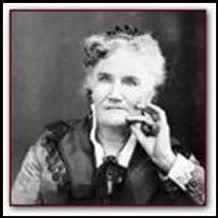Eliza Swain
The First Woman to Vote in the USA
The Western suffrage story began when Wyoming transformed a dream into reality in 1869. That year, the twenty-member Territorial Legislature approved a revolutionary measure stating: "That every woman of the age of twenty-one years, residing in this Territory, may at every election to beholden under the law thereof, cast her vote." William Bright, the bill's sponsor, had come to share his wife, Julia's, belief that suffrage was a basic right of American citizenship.
There was no organized suffrage campaign, and not a single parade, debate or public display. But women kept vigil outside Governor John A. Campbell's office until he signed the bill into law. Eliza A. "Grandma" Swain of Laramie claimed the honor of casting Wyoming's first female ballot in Sept 6th 1870. The next year Wyoming's women sat on juries, another simple but revolutionary inroad for women's rights.
Why would a western backwater like Wyoming, where there were more antelope than people, challenge the nation to embrace such a controversial experiment? Was it a publicity stunt to attract more settlers? A political ploy to advance partisan causes? There were many reasons offered in 1869, and no one explanation satisfies historians even to this day. It is clear, however, that Wyoming women embraced their right to vote and staunchly defended it against all threats.
Life for Wyoming women went on, despite the exaggerated eastern publicity. Town women organized small schools and churches and tried to keep saloons under control. Hardy ranch women survived the labors and wild adventures of raising cattle on dry windy prairies or in the snowy Rocky Mountains. Horsewomen rode astride in trousers, tracking and shooting elk, bobcat and pronghorn. Families crowded into dusty sod houses for shelter during blizzards. For most women, the right to participate fully in their community's politics became a fact of life as necessary as working, eating or breathing.
Wyoming statehood, in 1890, brought the frightening prospect that opponents of suffrage would rescind the right in the new constitution. Women lobbied hard against such threats. Two-thirds of the voters (all male) approved the proposed constitution with suffrage intact. The suffragists' powers of persuasion held up even when statehood was threatened in the face of congressional opposition. When the U.S. Congress, strongly opposed to women's suffrage, threatened to withhold statehood from Wyoming, Cheyenne officials sent back a staunchly worded telegram stating that Wyoming would remain out of the Union 100 years rather than join without women's suffrage. On July 10, 1890, President Benjamin Harrison signed the bill approving Wyoming as the nation's "Equality State."
Adapted with thanks from www.museumoftheamericanwest.org
FIND US
Whether you are traveling east or west simply take exit 255 from I-80, turn south towards the mountain and find us after 3 miles just beyond the town and left over the old bridge.
Please note that our parking lot has difficult access for long trailers or extra large vehicles. For peace of mind, please do not bring either of those into our parking lot. Instead please park along the access road near the dumpsters. Thank you!
CONTACT US
We will get back to you as soon as possible.
Please try again later.
© 2020 the Historic Elk Mountain Hotel
